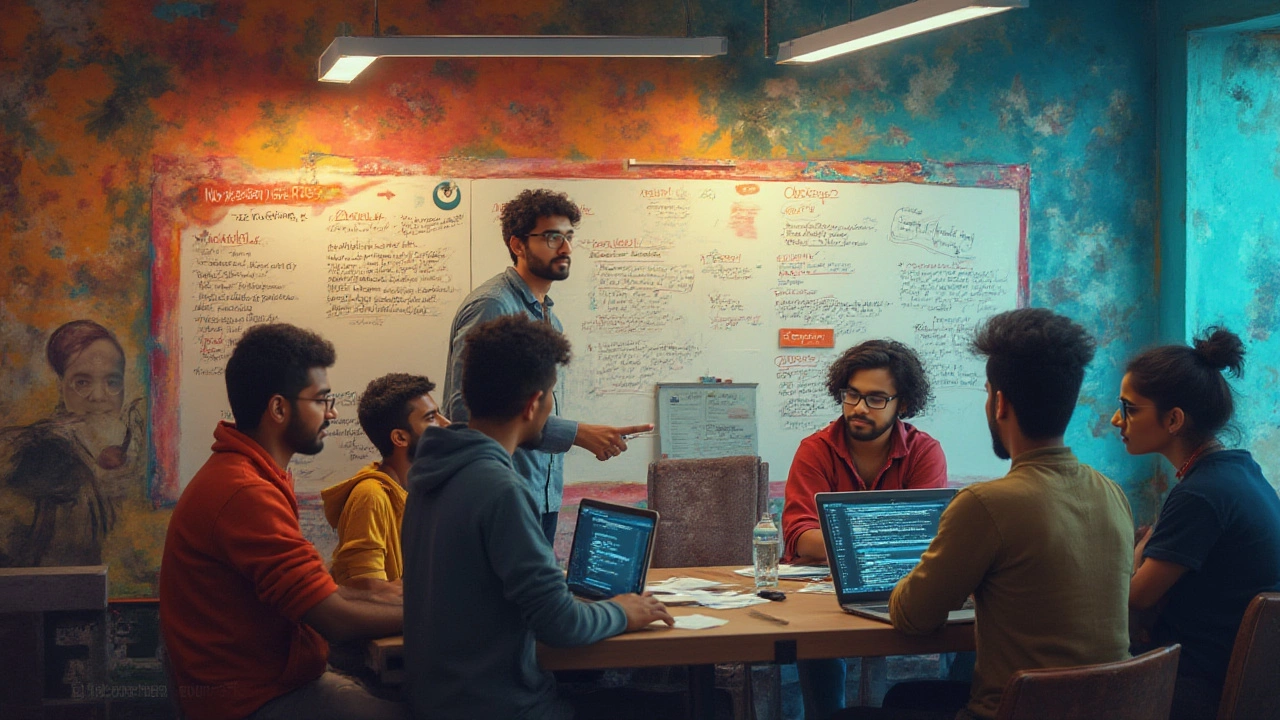Picture this: someone in their thirties holding a squirming toddler with one arm, typing out their first lines of JavaScript with the other. Coding hasn’t been a mysterious art for a select few for a long time—it’s become accessible, often self-taught by people juggling families, nine-to-fives, and everything in between. The catch? People still wonder if you can really pull it off without pricey degrees or boot camps. Spoiler: you absolutely can, and you’d be surprised how many developers started that way. Let’s get real about the process and the potholes you’re likely to hit, because this journey is more marathon than sprint.
The Reality of Learning to Code Without Formal Classes
First off, let’s bust a myth: universities don’t have a monopoly on coding skills, and they never did. Right now, about 70% of professional developers worldwide have at least some self-taught experience, according to the 2024 Stack Overflow Developer Survey. The tech industry cares more about what you can actually make than where you learned how. But that doesn’t mean teaching yourself to code is a breeze. The internet’s overflowing with free and paid resources—videos, courses, tutorials, endless blog posts—so the biggest challenge shifts from finding information to filtering it. A wild jungle of options can quickly overwhelm, so you need strategy as much as grit.
If you’re starting from scratch, it helps to set clear expectations. Nobody learns to code in a week—despite what those slick YouTube thumbnails promise. On average, beginners need about 300-500 hours of focused practice to get solid with basics like Python, HTML, or JavaScript. Want to land a job? That number jumps to 1000+ hours according to CareerFoundry’s 2023 survey. Exposing yourself to real code early matters: don’t just passively watch videos—open an editor and write code, even if it feels awkward or you get tons of errors. You’ll learn more in those frustrating moments than from reading about best practices all day.
The path is rarely linear, and frustrations will inevitably pile up. Ever spent an hour trying to fix a typo that broke your whole app? Welcome to day one. Mistakes aren’t a sign you can’t do it—they’re the whole learning process. And unlike school, nobody’s handing you a grade after every exercise. It can feel isolating at times, which is why connecting with a community—whether local, online forums, or even Discord coding servers—can keep you afloat. Remember, every coder—even that senior developer at your company—once Googled “why does my for loop not work.” If you ever feel lost, you’re in good company.
Is structure important? Yes, and that’s where many new coders get stuck. Picking a single high-quality course or curriculum helps—think Harvard’s CS50 (available free on edX), freeCodeCamp, or The Odin Project. Stick with one track at a time; doing too many at once leads to burnout and confusion. As you learn, build tiny projects—think calculators, to-do apps, or simple games. These give you something to show (and problems to debug), both of which are crucial. Personal projects let you explore concepts your way and keep things interesting, especially when motivation dips.
Kids like my son Gideon get this instinctively—when they want to make a Minecraft mod, they just dive in, break things, and laugh about mistakes. Adults can learn a lot from that kind of play. You’ll see old-school programmers everywhere on Reddit talking about how they started hacking together websites as teens. Coding is as much about creativity and experimentation as rules and syntax. Sure, the initial learning curve can seem brutal, but if you stick with it through the setbacks, you’ll find your groove sooner than you think.

Breaking Down What Actually Works (And What Doesn’t)
Let’s get practical and talk about what separates those who just dabble from those who go the distance. The internet is loaded with advice, but not all of it’s gold. First tip: treat coding like learning a musical instrument. Would you expect to master guitar by only watching videos, but never touching the strings? Of course not. Same goes for programming—you have to actually write and run code. This means setting up a simple, distraction-free workspace on your computer, grabbing a good text editor like VS Code, and getting used to typing out your ideas line by line.
Next, commit to daily progress, even if it’s just 20 minutes a day. Consistent, small practice works way better than binge-learning once a week. Most self-taught devs say they hit their first real breakthrough (“aha!” moment) after about 2-3 months of steady coding. You won’t remember everything at first, but muscle memory builds up. Don’t be afraid of making ugly, messy projects—those are stepping stones, not failures.
Keep an eye out for “tutorial hell.” This is where you keep watching lesson after lesson, but never actually create something new on your own. It’s a sneaky trap—a bit like feeling productive just by rearranging furniture instead of building the house. When you finish a lesson on loops, create a project using loops to solve a real problem. When you learn about APIs, connect two sites and grab live weather data. You learn faster by doing, not just by watching.
At some point, you’ll get stuck. Everyone does. But the ability to Google problems—searching for error messages, reading Stack Overflow threads—turns out to be a core skill for coders. Don’t be shy about asking questions, no matter how basic they seem. Online communities like r/learnprogramming, Stack Overflow, and freeCodeCamp’s forum are packed with people who once hit the exact same wall as you. You won’t “look dumb”—you’ll get answers, and most are happy to help.
One surprising stat? According to GitHub’s State of the Octoverse 2024 report, about 40% of open source contributors have no formal computer science degree at all. Instead, they jump right into real-world projects, collaborating with strangers and fixing bugs outside their comfort zones. If you ever want to level up, try contributing to a small open-source project. Even fixing a typo in documentation is a win. You’ll see how real teams work, pick up better habits, and grow way faster than slogging through solo tutorials.
It helps to keep your motivation strong by tracking progress with a visible list or journal. When you hit a roadblock, go back over what you accomplished two weeks earlier—it’s often more than you realize. Celebrate the wins—even if it’s just figuring out how to center a button or fetching your first data from an API. Those small victories build confidence and keep you moving forward. And don’t forget to take breaks. Burnout is real, especially if you’re balancing coding with work, kids, or life stuff. Step away sometimes, clear your head, and come back with fresh eyes.
Let’s not sugarcoat it—sometimes, you’ll want to quit. Maybe it’ll be after weeks wrestling with a bug, or when a bunch of new concepts suddenly pile on. That’s normal. Most self-taught coders hit a nasty dip right around the “intermediate” stage—the excitement wears off, and you realize there’s a ton you don’t know. If you push through by building something you care about—a simple game for your kid, a calendar app that actually suits your needs—you’ll often rediscover your spark without even noticing it.
| Resource | Format | Cost |
|---|---|---|
| freeCodeCamp | Interactive lessons/projects | Free |
| The Odin Project | Structured curriculum | Free |
| CS50 (edX) | University-level course | Free |
| Codecademy | Interactive lessons | Freemium |
| Stack Overflow | Q&A forum | Free |
And don’t forget, there’s no “perfect” way to learn. People succeed with videos, books, podcasts, pairing up with friends, or experimenting in code playgrounds like Replit. What matters is picking something and sticking with it long enough to see results. The most important ingredient? teach yourself to code by getting hands-on and fixing your own mistakes along the way. People who code for a living didn’t get there overnight. They just tried, failed a bunch, and refused to stop showing up. You can too.

From First Lines to First Job: Real-World Tips for Staying the Course
Alright, let’s say you’ve picked up a few basics—maybe you’ve made a little calculator or a personal website. Where do you go from there if your goal is more than just a hobby? The path to landing that first tech job isn’t as magic as it might look on LinkedIn. Most hiring managers want to see what you can actually build. Certificates and degrees can help, but showing off a portfolio of real projects wins hearts (and interviews) much faster.
Your next step: make projects that solve actual problems, not just tutorial exercises. Think about stuff in your day-to-day life or work that annoys you—a shopping list app that sorts by aisle, a budget tracker, or a Minecraft helper for your kid. These projects don’t have to be unique, but making them forces you out of your comfort zone. You’ll hit weird bugs, need to Google best ways, and maybe even figure out new ways to use existing tools. All of that makes you valuable to future employers, whether you’re aiming for full-time work or side gigs.
Building a portfolio doesn’t mean a fancy website at first. Just push code to GitHub, document what your project does, and keep track of progress. When you’re ready, you can slap together a simple web page that links to your best work. Interviewers often look for signs that you know how to break down problems and actually finish what you start, rather than just dabbling.
You might wonder if you need to learn algorithms and data structures right away. The truth? For most entry-level jobs, practical skills matter more. You don’t need to memorize sorting algorithms before you’ve built a few apps. But when you’re ready to prep for job interviews, spending a few weeks brushing up on these topics using places like LeetCode or HackerRank gives you an edge and makes those tricky technical interviews less intimidating.
One big question that always pops up: how long before you’re “job ready”? For most self-taught devs, it takes anywhere from six months to a year of steady learning to comfortably pass interviews for a junior role. But here’s the catch—everybody moves at their own pace. Some land gigs faster, some slower. Consistency trumps speed. Over half of developers in the Stack Overflow survey say they still learn new things every week, even after years in the industry. Imposter syndrome? Totally normal. Even people with years behind the keyboard still feel it sometimes.
If you ever feel isolated, try reach out to coding meetups, hackathons, or online events like “100 Days of Code.” The encouragement from others and getting honest feedback on your work can jump-start your growth big time. You don’t need to live in New Zealand, London, or Silicon Valley to find a tribe—you just need an internet connection and a bit of courage to ask for help. I’ve seen folks in the Auckland tech community land jobs after building cool open-source widgets or games for their kids, simply because they shared the code and kept at it.
And for parents or busy adults: there’s no shame in going slow. On my own journey, some days I squeeze in half an hour after the kids go to bed. Other days, I do nothing. Progress stacks up, even if it feels like it’s happening in slow motion. What matters is showing up and being kind to yourself about the journey.
The truth is, self-taught programmers aren’t rare—they’re the beating heart of the industry. Every big open source project has at least a handful of contributors who started out just like you, with no formal background and only Google, a keyboard, and lots of stubbornness. Stick with it, aim to read and write real code every week, and before long you’ll look back and realize you’re no longer just copying and pasting—you’re building for real.

